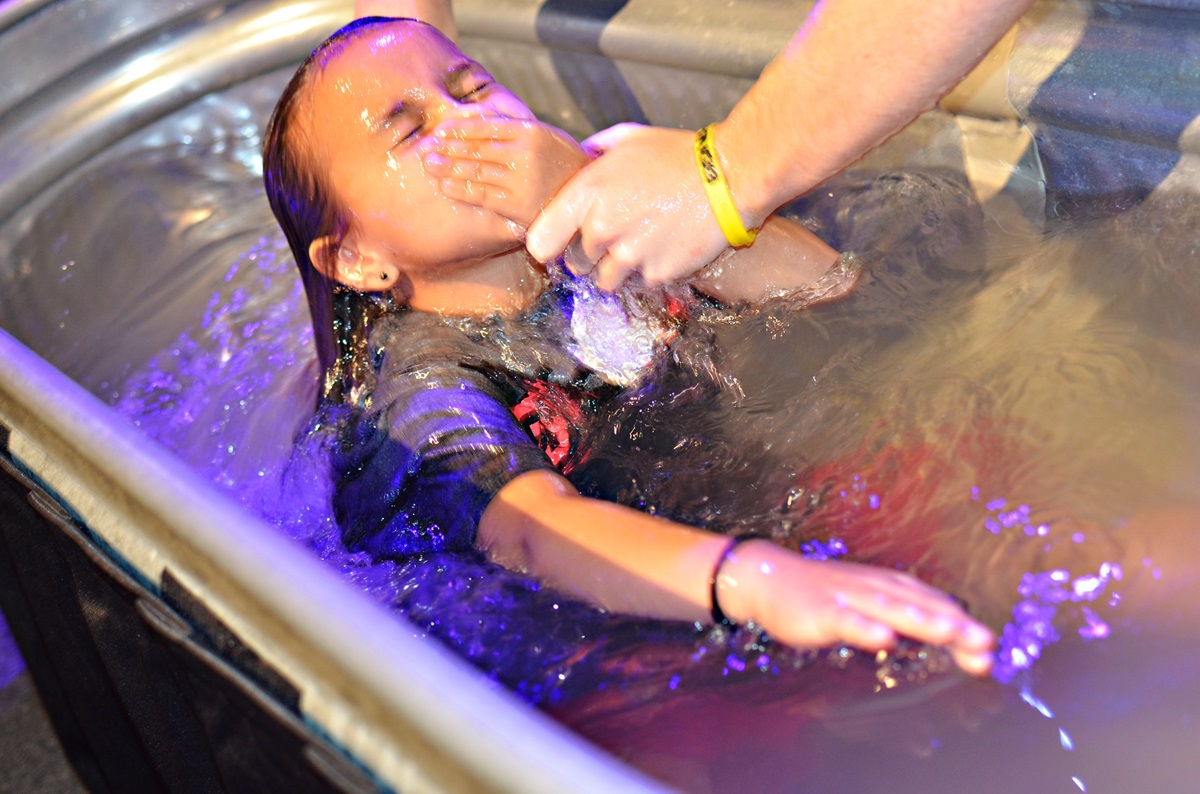I’ll always regret baptizing 10% of our kids in Vacation Bible School that year. Yes, that’s right—keep reading to find out why.

That sizzling summer stands out to me in sharp relief. It represents the height of this evangelical (at the time) pastor’s missionary fervor. It was my second summer at the church. I’d been there long enough to visit most of the families, endear myself to the children, and begin to have influence in their lives. Ours was a patriotic small town. So, on the Fourth of July, we used our award-winning parade float to hand out candy and invitations to all the kids. Since we planned our VBS for the week after this annual advertisement opportunity, we had a record number of kids at church that year.
For God So Loved the World…
At VBS, we hit them hard with the Gospel. This sounded good to the initiated at the time. But in retrospect, it sounded like, “For God so loved the world that God made a place called hell, planning to burn most people in eternal conscious torment. But God loves Christians best—so if only you’d become a Christian, you’d escape being tortured by the God who loves you so much.” This is not the article where I discuss what I don’t believe about hell. Suffice it to say that whatever you think about the afterlife, scare tactics with children are not cool.
Not Just an Eternal Reward
If we offered a terrifying message on the one side, we offered a tremendous reward on the other side. And not just an eternal reward, either. Every time a child prayed the Sinner’s Prayer, we brought them to the front of the church and applauded. They received a gift award Bible. A couple of months later, we had a big celebration where they all got to swim in the river and get baptized. And they all knew how proud their families would be.
So that summer, out of a hundred and fifty kids who attended VBS, fifteen children gave their lives to Jesus. And the church celebrated. But what happened next?
Some Continued in Faith
Some of those kids continued attending the church. There, church members nurtured and discipled them. Today, they are young men and women of faith. I’m still pretty happy about that. These defining moments of spiritual growth are so important. I am not suggesting that salvation and baptism aren’t meaningful in their lives. But just like this article isn’t about heaven and hell, it also isn’t about the ones who remained in church and practice their faith today. This is about the other ones.
Getting them Saved and Baptized
The truth is most of those kids no longer attend that church, or any church at all. One reason is that our church leaders never followed up. We were too focused on the celebration, and on the number of baptisms we could report to our denomination. Instead, we should have been more interested in fostering the spiritual growth of young people and their families. It was about “getting them saved and baptized” as the end goal, and not about discipling young believers. It was about making converts. Because a pastor or a short-term VBS staff can easily do that, but it takes a long-term commitment to make disciples. And as one already overworked pastor (with little help from the deacons), I couldn’t keep up.
The Follow-Up Work
You may ask why nobody else thought it important enough to do that follow-up work. If you believe in individual salvation defined as going to heaven when you die, based on faith that’s expressed when you pray the Sinner’s Prayer and when you get baptized, and if you cling to “once saved, always saved,” then you become obsessed with evangelism and tend to de-emphasize discipleship. It’s easy for church members to place all the responsibility for evangelism on their pastor (we pay pastors to preach, don’t we?) without taking on the burden of instructing your children yourself. So, it’s up to the overworked pastor to evangelize them, but not up to the church as a whole to train young believers in their faith.
Oh sure, we had Sunday school for those families that were proactive enough to bring their children. But those classes reinforce the teaching that all you need to do is “accept Jesus.” After that, you sit back, relax, and see how you can convince your pastor to preach more evangelistic sermons so others can join the club. And when that’s what it’s all about, then once you get “saved and baptized,” there isn’t a lot to keep you involved. So, you eventually outgrow the church. When that happens often enough, the church begins to die.
Emphasis on Personal Salvation
Another reason “getting them saved and baptized” is killing the church, is the extreme emphasis placed on personal salvation. Roman Catholic, Orthodox, and mainline churches focus on salvation as part of a communal experience. But Evangelicals elevate personal salvation and personal relationship with God above all else. The result can be deep spirituality, yes. But the side effect is often a disconnect from a sense of community.
Personal faith is too easily divorced from believers seeking wisdom together, sharing the joy and pain of others, and investing in the life of the larger body and those within it. It’s also too easily separated from social conscience and justice work. I’m not negating the need for personal faith. But with the way Evangelicals often emphasize personal salvation as “getting saved and baptized,” it becomes easy to say, “I can worship God just as well on my boat as in the church.” And it’s even easier to abandon a church when things go wrong. So, while personal faith is good, when we define the end goal as “getting them saved and baptized,” we create a sense of “been there, done that.”
Getting Little Johnny “Done”
I can’t tell you the number of times parents and grandparents have said to me, “Pastor, don’t you think it’s about time we got little Johnny done?” And, by that, they mean that once the kid gets baptized, they can quit worrying that their offspring might spend eternity burning in divinely inspired agony. Getting them done means taking out a fire insurance policy. And once they have that policy, neither Johnny nor his family really needs to be in church anymore. And this is killing the church.
Being a Christian vs. Acting Like Jesus
Another reason an emphasis on “getting them saved and baptized” is killing the church is that there seems to be a disconnect between “being a Christian” and acting like Jesus. Once you’ve got your ticket to heaven, then you can turn around and be a racist, sexist, xenophobic ableist who hates LGBTQIA+ folks. You can support putting children in cages because their parents are undocumented. You can force women to travel to another state to get appropriate OBGYN care. During a pandemic, you can refuse to wear a mask because you care about your convenience more than you love your neighbor. And you can support tax cuts for the rich while depriving the poor of a livable minimum wage. You can do all these things because, as far as you’re concerned, being a Christian is all about getting “saved and baptized.”
Saved and Baptized White Evangelicals
The thing is, the younger generation sees this hypocrisy of white Evangelicals and has had their fill of it. They’re leaving the church in droves, because “getting them saved and baptized” requires nothing of a person, morally. It was “saved and baptized” white Evangelicals who enslaved Africans, who burned crosses on front lawns, and who uphold white supremacy today. Saved-and-baptized Christians have contributed to the fact that LGBTQIA+ youth are 120% more likely to experience homelessness than other youth, and why 40% of LGBTQIA+ youth seriously considered suicide in the past year.
Yes, it was saved and baptized Christians who promoted the doctrine of expansionism which has killed and oppressed countless Indigenous people. These same saved and baptized people support politicians whose personal lives and political decisions are the opposite of Christlike. They hail these politicians as heroes, simply because they support the political agenda of the elite. And the world is catching on, that when the goal of religion is “getting them saved and baptized,” you can do whatever you want and still call yourself a Christian.
Killing the Church
This kind of evangelism is killing the church. Unless we act like Jesus, we demonstrate to the world that our faith is useless. Unless we vote for the things that our loving, embracing, healing Jesus would vote for, we show our young people that it’s really all about power politics and not about caring for our neighbor. We can have all the Vacation Bible Schools we want, lead them in the Sinner’s Prayer, and dunk them in the water. But if we don’t lead by example and teach them to act like Jesus, they’re going to see the church as meaningless, and they’ll leave. That’s why I’ll always regret baptizing so many kids that year—because we’ve failed to teach them to act like Jesus.
If You Don’t Want to Kill the Church…
This generation is smart. They know hypocrisy when they see it. And they can tell when you’re trying to scare the hell out of them to get them into heaven. They know that, while you say that God is love, you really view God as a violent dictator in the sky who likes to torture his own creation. And they can tell when your religion is all about fire insurance and has nothing to do with living and loving and changing society as Jesus would. So, Christian, if you don’t want to kill the church, it’s time to de-emphasize “getting them saved and baptized,” and start prioritizing Actual Jesus. Because it’ll kill the church if you keep talking like you’re going to heaven, while you make hell on earth for the “least of these.”


















